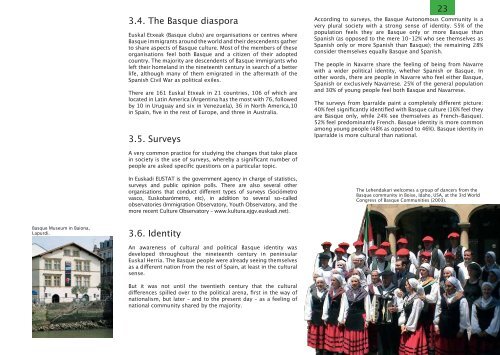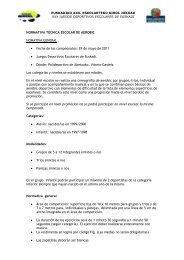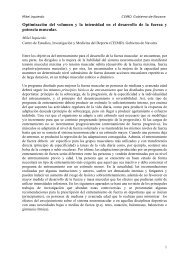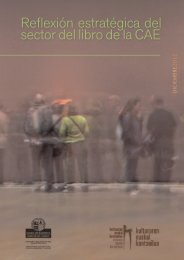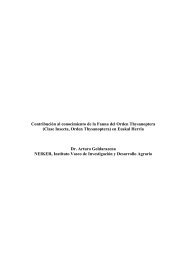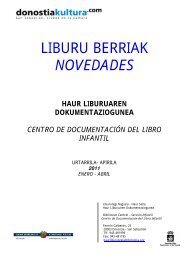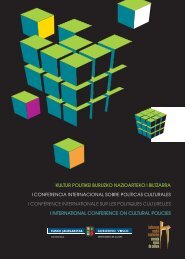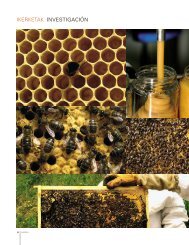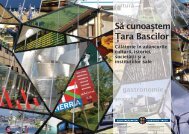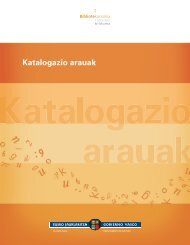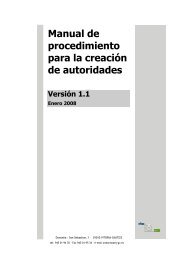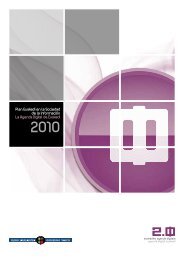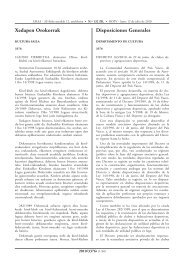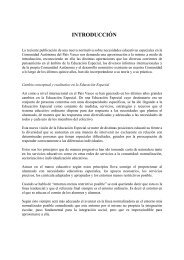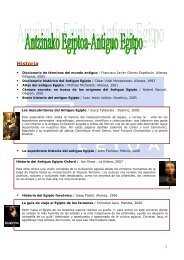The Basque Country (pdf, 4,3Mb) - Kultura Saila - Euskadi.net
The Basque Country (pdf, 4,3Mb) - Kultura Saila - Euskadi.net
The Basque Country (pdf, 4,3Mb) - Kultura Saila - Euskadi.net
Create successful ePaper yourself
Turn your PDF publications into a flip-book with our unique Google optimized e-Paper software.
3.4. <strong>The</strong> <strong>Basque</strong> diaspora<br />
Euskal Etxeak (<strong>Basque</strong> clubs) are organisations or centres where<br />
<strong>Basque</strong> immigrants around the world and their descendents gather<br />
to share aspects of <strong>Basque</strong> culture. Most of the members of these<br />
organisations feel both <strong>Basque</strong> and a citizen of their adopted<br />
country. <strong>The</strong> majority are descendents of <strong>Basque</strong> immigrants who<br />
left their homeland in the ni<strong>net</strong>eenth century in search of a better<br />
life, although many of them emigrated in the aftermath of the<br />
Spanish Civil War as political exiles.<br />
<strong>The</strong>re are 161 Euskal Etxeak in 21 countries, 106 of which are<br />
located in Latin America (Argentina has the most with 76, followed<br />
by 10 in Uruguay and six in Venezuela), 36 in North America,10<br />
in Spain, five in the rest of Europe, and three in Australia.<br />
3.5. Surveys<br />
23<br />
According to surveys, the <strong>Basque</strong> Autonomous Community is a<br />
very plural society with a strong sense of identity. 55% of the<br />
population feels they are <strong>Basque</strong> only or more <strong>Basque</strong> than<br />
Spanish (as opposed to the mere 10-12% who see themselves as<br />
Spanish only or more Spanish than <strong>Basque</strong>); the remaining 28%<br />
consider themselves equally <strong>Basque</strong> and Spanish.<br />
<strong>The</strong> people in Navarre share the feeling of being from Navarre<br />
with a wider political identity, whether Spanish or <strong>Basque</strong>. In<br />
other words, there are people in Navarre who feel either <strong>Basque</strong>,<br />
Spanish or exclusively Navarrese. 25% of the general population<br />
and 30% of young people feel both <strong>Basque</strong> and Navarrese.<br />
<strong>The</strong> surveys from Iparralde paint a completely different picture:<br />
40% feel significantly identified with <strong>Basque</strong> culture (16% feel they<br />
are <strong>Basque</strong> only, while 24% see themselves as French-<strong>Basque</strong>).<br />
52% feel predominantly French. <strong>Basque</strong> identity is more common<br />
among young people (48% as opposed to 46%). <strong>Basque</strong> identity in<br />
Iparralde is more cultural than national.<br />
A very common practice for studying the changes that take place<br />
in society is the use of surveys, whereby a significant number of<br />
people are asked specific questions on a particular topic.<br />
In <strong>Euskadi</strong> EUSTAT is the government agency in charge of statistics,<br />
surveys and public opinion polls. <strong>The</strong>re are also several other<br />
organisations that conduct different types of surveys (Sociómetro<br />
vasco, Euskobarómetro, etc), in addition to several so-called<br />
observatories (Immigration Observatory, Youth Observatory, and the<br />
more recent Culture Observatory – www.kultura.ejgv.euskadi.<strong>net</strong>).<br />
<strong>The</strong> Lehendakari welcomes a group of dancers from the<br />
<strong>Basque</strong> community in Boise, Idaho, USA, at the 3rd World<br />
Congress of <strong>Basque</strong> Communities (2003).<br />
<strong>Basque</strong> Museum in Baiona,<br />
Lapurdi.<br />
3.6. Identity<br />
An awareness of cultural and political <strong>Basque</strong> identity was<br />
developed throughout the ni<strong>net</strong>eenth century in peninsular<br />
Euskal Herria. <strong>The</strong> <strong>Basque</strong> people were already seeing themselves<br />
as a different nation from the rest of Spain, at least in the cultural<br />
sense.<br />
But it was not until the twentieth century that the cultural<br />
differences spilled over to the political arena, first in the way of<br />
nationalism, but later – and to the present day – as a feeling of<br />
national community shared by the majority.


